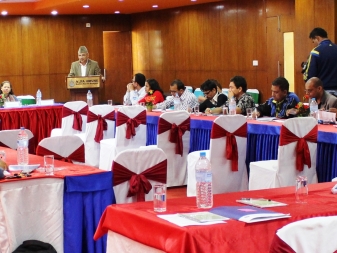
Kathmandu: Experts and professionals working in the field of Technical and Vocational Education and Training (TVET) have called attention to the limited—and frequently, complete absence of—participation of women, Janjatis, Dalits, persons with disability and sexual minorities, among other marginalized groups, in various technical-vocational training programs currently operational in Nepal. During an interaction organized by UNDP’s Support to Knowledge and Lifelong Learning Skills (SKILLS) program on July 6, the experts underlined the need for effective incorporation of Gender Equality and Social Inclusion (GESI) approaches to give the aforementioned groups equal access to TVET opportunities.
Rajesh Verma of UNDP’s Micro-Enterprise Development Programme (MEDEP) maintained that the TVET programs and packages should be developed in a manner so that they would address the socio-economic needs of targeted groups. Similarly, Keshav Ghimire, Deputy Director of the Council of Technical Education and Vocational Training (CTEVT)—the premier government body for the production of skillful and technical human resources in the country—also stressed on the need for GESI integration in TVET policy review and development.
Shedding further light on the issue, Binda Magar, Gender and Social Inclusion Adviser at UNDP, said that reviewing the TVET Policy 2012 to identify and do away with the existing discriminatory provisions is as necessary as coming up with complimentary provisions to ease the access of marginalized and backward communities to TVET programs so as to capacitate and empower them to seek employment.
Experts also doubted whether information and provisions regarding TVET programs in the country have been sufficiently disseminated to targeted groups, adding that they have also found through their years of professional in TVET sector that access to as well as content of the technical-vocational training programs are not readily available to targeted groups.
In her presentation, Sunila Baniya, a professional in the education and skills development field, said that as a remedy to this lack of information flow, municipalities as well as newly-formed rural municipalities should step in to make local people as well as targeted groups more aware about various vocational trainings being provided in their locality as well as the country at large.
UNDP’s SKILLs program together with Ministry of Education of the Government of Nepal is holding numerous TVET policy consultative meetings like this one across Nepal to solicit inputs from stakeholders to help identify gaps in the existing TVET policy 2012 for its review and better coherence.

